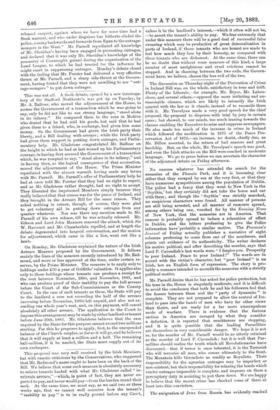This was not all. A fresh debate, opened by a
new interroga- tory of Sir Stafford Northcote's, was got up on Tuesday, by Mr. A. Balfour, who moved the adjournment of the House, to accuse the Government of a transaction which he was going to say, only he did not like to use strong language, " stood alone in its infamy." He compared them to the man in Moliere who denied that he had sold his goods, but said that he had given them to a friend, who, in exchange, had given him some money. So the Government had given the Irish party their liberty, and a Bill dealing with arrears ; while the Irish party had given them support in putting down outrages, and Parlia- mentary help. Mr. Gladstone congratulated Mr. Balfour on the height to which he had at last wound up his Parliamentary courage, in having first accused the Government of a transaction which, he was tempted to say, " stood alone in its infamy," and in having then, as the logical consequence of that accusation, moved the adjournment of the House. The Prime Minister repudiated with the utmost warmth having made any terms with Mr. Parnell. Mr. Parnell's offer of Parliamentary help he had at once told Mr. Forster that they had no right to expect, and as Mr. Gladstone rather thought, had no right to accept. They liberated the imprisoned Members simply because they really believed that that course was for the peace of Ireland, and they brought in the Arrears Bill for the same reason. They asked nothing in return, though, of course, they were glad to get voluntary aid in putting down outrages from any quarter whatever. Nor was there any mention made to Mr. Parnell of his own release, till he was actually released. Mr. Gibson and Lord John Manners renewed the attack, which Sir W. Harcourt and Mr. Chamberlain repelled, and at length the debate degenerated into languid conversation, and the motion for adjournment, which came in like a lion, went out like a lamb.
































 Previous page
Previous page